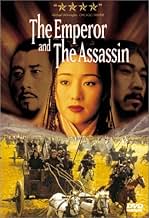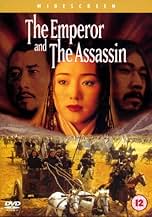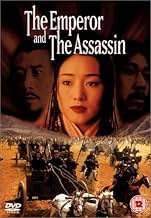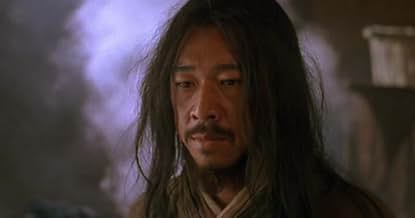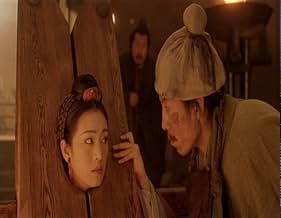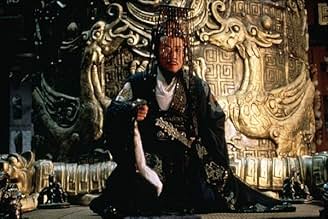IMDb रेटिंग
7.2/10
6.6 हज़ार
आपकी रेटिंग
अपनी भाषा में प्लॉट जोड़ेंIn pre-unified China, the King of Qin sends his concubine to a rival kingdom to produce an assassin for a political plot, but as the king's cruelty mounts she finds her loyalty faltering.In pre-unified China, the King of Qin sends his concubine to a rival kingdom to produce an assassin for a political plot, but as the king's cruelty mounts she finds her loyalty faltering.In pre-unified China, the King of Qin sends his concubine to a rival kingdom to produce an assassin for a political plot, but as the king's cruelty mounts she finds her loyalty faltering.
- पुरस्कार
- 7 जीत और कुल 11 नामांकन
फ़ीचर्ड समीक्षाएं
After seeing dressed up action films, like the two mentioned above, Emperor and the Assassin was a godsend. This film was such a marvelous blend of action, intrigue, and personality, and I'm sure I'll see it again and again in years to come.
Some of the complaints about the movie have been the golden/brown tint and the quick, disorienting editing. However, I loved both of these qualities in the movie, though the editing did take some time to get used to. A great example of it, is when we're introduced to Jing Ke, the assassin. He is offered an assignment for five thousand, and we see a close up of his face as he demands ten thousand. The next shot shows him with sword drawn, in the house of his victims. That whole introduction to the assassin was marvelously edited, in my opinion. You have to realize that in order to fit the epic plot into just under three hours, a lot of tiny details needed to be cut out. The quick editing also makes the movie seem much shorter than it really is.
Someone said that the swordfighting in the movie (what little of it there was) seemed like high school drama, but I strongly disagree. Most of the action is captured in a few shots, making it seem much more realistic. In so many american films, we see a a flash of a dozen close ups, without getting a feel for what is even happening! Also, the constant use of slow motion in many movies gets so old. By having the fighting in this movie fast and furious, it is much more affecting.
I won't give away the ending, but it was really suspenseful and surprising. I had no idea what would happen (being unfamiliar with Chinese history helped), and was on the edge of my seat! So, to conclude, if you like sweeping historical epics, make sure to see this! I really like the films of Kurosawa, and saw some similarities here, so also if you like his movies, see this!!
Some of the complaints about the movie have been the golden/brown tint and the quick, disorienting editing. However, I loved both of these qualities in the movie, though the editing did take some time to get used to. A great example of it, is when we're introduced to Jing Ke, the assassin. He is offered an assignment for five thousand, and we see a close up of his face as he demands ten thousand. The next shot shows him with sword drawn, in the house of his victims. That whole introduction to the assassin was marvelously edited, in my opinion. You have to realize that in order to fit the epic plot into just under three hours, a lot of tiny details needed to be cut out. The quick editing also makes the movie seem much shorter than it really is.
Someone said that the swordfighting in the movie (what little of it there was) seemed like high school drama, but I strongly disagree. Most of the action is captured in a few shots, making it seem much more realistic. In so many american films, we see a a flash of a dozen close ups, without getting a feel for what is even happening! Also, the constant use of slow motion in many movies gets so old. By having the fighting in this movie fast and furious, it is much more affecting.
I won't give away the ending, but it was really suspenseful and surprising. I had no idea what would happen (being unfamiliar with Chinese history helped), and was on the edge of my seat! So, to conclude, if you like sweeping historical epics, make sure to see this! I really like the films of Kurosawa, and saw some similarities here, so also if you like his movies, see this!!
This is an excellent film. No, it's not Mel Gibson in "Braveheart," but then, it's not trying to be. Actually, "The Emperor and the Assassin" probably has (thankfully) more in common with a Shakespearean production than a Hollywood blockbuster.
In the third century BC, the King of Qin is attempting to unite (in other words "conquer") the seven kingdoms of China. He has already overthrown the Kingdom of Han. Now he needs an excuse to invade the Kingdom of Yan.
This is where the Lady Zhao comes in. She and the King have been friends since childhood. They are obviously very much in love, but cannot marry for political reasons. Together they devise a plot. She will pretend to have fallen into disfavor with the King and escape to Yan. Once there she will convince the Prince of Yan to send an assassin back to kill the King. When the assassination fails, the King will have his excuse to invade Yan.
Once in Yan, however, Lady Zhao begins to reconsider. Hearing and seeing more and more examples of her old childhood friend's ruthlessness, she begins to wonder if the King may need to be assassinated for real.
One sure sign that you're not watching a Hollywood production is the final encounter between the King and the assassin. Unlike a Hollywood movie where the hero and villain are clearly defined and the final outcome already predetermined, this is a fight that could truly go either way.
This is a well crafted and well acted story of a tumultuous time in Chinese history. There is a mixture of both incredible beauty and incredible ugliness. Most beautiful of all, however, is Gong Li as the Lady Zhao. I grow more and more convinced every time I see her that Gong Li is the most beautiful woman in the world.
I must say, however, that she does have one unintentionally funny line in this film. Early on Gong Li asks one of her servants "Do I have a beautiful face?"
Duh!!!
In the third century BC, the King of Qin is attempting to unite (in other words "conquer") the seven kingdoms of China. He has already overthrown the Kingdom of Han. Now he needs an excuse to invade the Kingdom of Yan.
This is where the Lady Zhao comes in. She and the King have been friends since childhood. They are obviously very much in love, but cannot marry for political reasons. Together they devise a plot. She will pretend to have fallen into disfavor with the King and escape to Yan. Once there she will convince the Prince of Yan to send an assassin back to kill the King. When the assassination fails, the King will have his excuse to invade Yan.
Once in Yan, however, Lady Zhao begins to reconsider. Hearing and seeing more and more examples of her old childhood friend's ruthlessness, she begins to wonder if the King may need to be assassinated for real.
One sure sign that you're not watching a Hollywood production is the final encounter between the King and the assassin. Unlike a Hollywood movie where the hero and villain are clearly defined and the final outcome already predetermined, this is a fight that could truly go either way.
This is a well crafted and well acted story of a tumultuous time in Chinese history. There is a mixture of both incredible beauty and incredible ugliness. Most beautiful of all, however, is Gong Li as the Lady Zhao. I grow more and more convinced every time I see her that Gong Li is the most beautiful woman in the world.
I must say, however, that she does have one unintentionally funny line in this film. Early on Gong Li asks one of her servants "Do I have a beautiful face?"
Duh!!!
10oaksong
I've read some grumbles about the court scenes. These people betray their ignorance. This production went to simply amazing lengths to recreate all aspects of the period in which the story occurred. Courtly manners are something few people outside the court ever see. While the acting may appear highly stylized, it is, in fact, as close a replication as possible of the behavior of individuals in their particular stations as the director could create. The actor's facial expressions are a marvel, particularly the duplicitous Marquis Changxin and the King's mother.
There are, of course, reflections of both Greek and Shakespearian tragedy in the relationship between the king, his parents and his love. The juxtaposition of the king transforming from good to bad and the assassin from bad to good provides much food for thought on the evolution of an individual's nature. This movie would provide much to ponder in a college course on the humanities.
At the same time, it almost rushes along, even in the slowest scenes heading towards an inexorable denouement. One suspects the involvement of large portions of the troop movements, which were quite awesome. It makes The Lord of the Rings battle scenes pale by comparison. Few directors have the ability to literally field thousands of humans on the field of battle just for art's sake. I recall one scene in which at least 30,000 troops can be seen moving across a huge plain. The logistics for such a shot would have been staggering.
I could go on... but simply, I can't recommend this film highly enough.
There are, of course, reflections of both Greek and Shakespearian tragedy in the relationship between the king, his parents and his love. The juxtaposition of the king transforming from good to bad and the assassin from bad to good provides much food for thought on the evolution of an individual's nature. This movie would provide much to ponder in a college course on the humanities.
At the same time, it almost rushes along, even in the slowest scenes heading towards an inexorable denouement. One suspects the involvement of large portions of the troop movements, which were quite awesome. It makes The Lord of the Rings battle scenes pale by comparison. Few directors have the ability to literally field thousands of humans on the field of battle just for art's sake. I recall one scene in which at least 30,000 troops can be seen moving across a huge plain. The logistics for such a shot would have been staggering.
I could go on... but simply, I can't recommend this film highly enough.
Based on the actual event , this epic, is set in the year 221 B.C and tells the true story of the unification of China. Action packed and filled with intrigue, passion, betrayals and unforgettable battle sequences, it held my attention throughout in spite of its 160 minute length.
The king, Ying Zeng, played by Li Xuejian is obsessed with unifying the seven kingdoms of China and becoming its first Emperor. His lover, Lady Zhao, played by the beautiful actress Gong Li, devises a plot whereby she will travel to the neighboring kingdom of Yan to set a fake assassination plot in motion which will give the king an excuse to invade Yan. However, she falls in love with the assassin as the king becomes more and more ruthless.
There are subplots, and tragedy and constant high drama. There are scenes of great beauty and of abject cruelty. There is great cinematography and brilliant use of physical space.
The deep characterization made me think of Shakespeare. And tragic events that call to mind Greek drama. And yet it is totally Chinese as it deals with age-old questions of whether the ends justify the means. And raises the questions dealing with life and death and good and evil and all the blurred edges in between.
It is the story of individuals against the backdrop of history, a history that has shaped China for the past two thousand years. I was swept up in the story as well as the moral questions raised. There are no easy answers and this was one of the strengths of the movie.
Recommended. But be prepared for the violence and gore.
The king, Ying Zeng, played by Li Xuejian is obsessed with unifying the seven kingdoms of China and becoming its first Emperor. His lover, Lady Zhao, played by the beautiful actress Gong Li, devises a plot whereby she will travel to the neighboring kingdom of Yan to set a fake assassination plot in motion which will give the king an excuse to invade Yan. However, she falls in love with the assassin as the king becomes more and more ruthless.
There are subplots, and tragedy and constant high drama. There are scenes of great beauty and of abject cruelty. There is great cinematography and brilliant use of physical space.
The deep characterization made me think of Shakespeare. And tragic events that call to mind Greek drama. And yet it is totally Chinese as it deals with age-old questions of whether the ends justify the means. And raises the questions dealing with life and death and good and evil and all the blurred edges in between.
It is the story of individuals against the backdrop of history, a history that has shaped China for the past two thousand years. I was swept up in the story as well as the moral questions raised. There are no easy answers and this was one of the strengths of the movie.
Recommended. But be prepared for the violence and gore.
This is an epic film about the unification of the ancient kingdoms of China in the third century BC. What makes it interesting is the tragic downfall of the king and all the palace intrigue going on around him. It reminded me a bit of "King Lear" and some of the other Shakespeare plays.
The king starts out with noble ambitions, to unify the kingdoms under one ruler and to stop all the quarrelling so that the people can prosper and lead better lives. He and his childhood sweetheart, played beautifully by Li Gong, concoct a scheme whereby she pretends to go into exile in a rival kingdom in order to recruit an assassin to kill the king, thus giving him a pretext to go to war. But while she's away, the king becomes sadistic in his lust for power and goes on a killing spree.
There are numerous side plots that keep the action going. There is the Marquis, who pretends to be stupid and foppish but who's really very clever and wants to become king himself. He fathers two children with the king's mother and manages to keep it secret for years. Then there is the Prime Minister, a political rival to the king, who turns out to really be his father.
The assassin is a complex character himself. An adept swordsman and killer, he is undergoing a reformation when the king's lover comes to recruit him. He wants nothing more with killing, but is eventually won over by Li Gong (who wouldn't be?) when he sees how cruel and vicious the king has become.
Some spectacular cinematography, especially the battle scenes that are carried out on a grand scale - like they used to say, a cast of thousands, literally. The acting is OK, nothing special. It's the story that's interesting, though at over two and a half hours, it pushes the limit.
Definitely worth viewing.
The king starts out with noble ambitions, to unify the kingdoms under one ruler and to stop all the quarrelling so that the people can prosper and lead better lives. He and his childhood sweetheart, played beautifully by Li Gong, concoct a scheme whereby she pretends to go into exile in a rival kingdom in order to recruit an assassin to kill the king, thus giving him a pretext to go to war. But while she's away, the king becomes sadistic in his lust for power and goes on a killing spree.
There are numerous side plots that keep the action going. There is the Marquis, who pretends to be stupid and foppish but who's really very clever and wants to become king himself. He fathers two children with the king's mother and manages to keep it secret for years. Then there is the Prime Minister, a political rival to the king, who turns out to really be his father.
The assassin is a complex character himself. An adept swordsman and killer, he is undergoing a reformation when the king's lover comes to recruit him. He wants nothing more with killing, but is eventually won over by Li Gong (who wouldn't be?) when he sees how cruel and vicious the king has become.
Some spectacular cinematography, especially the battle scenes that are carried out on a grand scale - like they used to say, a cast of thousands, literally. The acting is OK, nothing special. It's the story that's interesting, though at over two and a half hours, it pushes the limit.
Definitely worth viewing.
क्या आपको पता है
- ट्रिवियाThe Xianyang palace was reconstructed in its entirety in the city of Dongyang in Zhenjiang province. Much of the film, including the final scene, was shot there. It is now being preserved as a theme park drawing large numbers of tourists. In addition, the capital cities of the other kingdoms featured in the film, Yan Zhao and Han, were constructed as several sights across China. All have been meticulously built to scale with special attention paid to their historical accuracy.
- इसके अलावा अन्य वर्जनFirst cut was deemed regime-critic by chinese censors and therefore rejected. Approximately 30 minutes were cut to make a more regime-friendly version.
टॉप पसंद
रेटिंग देने के लिए साइन-इन करें और वैयक्तिकृत सुझावों के लिए वॉचलिस्ट करें
- How long is The Emperor and the Assassin?Alexa द्वारा संचालित
विवरण
- रिलीज़ की तारीख़
- कंट्री ऑफ़ ओरिजिन
- आधिकारिक साइटें
- भाषा
- इस रूप में भी जाना जाता है
- The Emperor and the Assassin
- उत्पादन कंपनियां
- IMDbPro पर और कंपनी क्रेडिट देखें
बॉक्स ऑफ़िस
- बजट
- $1,50,00,000(अनुमानित)
- US और कनाडा में सकल
- $12,67,239
- US और कनाडा में पहले सप्ताह में कुल कमाई
- $47,295
- 19 दिस॰ 1999
- दुनिया भर में सकल
- $12,67,239
- चलने की अवधि2 घंटे 42 मिनट
- रंग
- ध्वनि मिश्रण
- पक्ष अनुपात
- 1.85 : 1
इस पेज में योगदान दें
किसी बदलाव का सुझाव दें या अनुपलब्ध कॉन्टेंट जोड़ें



